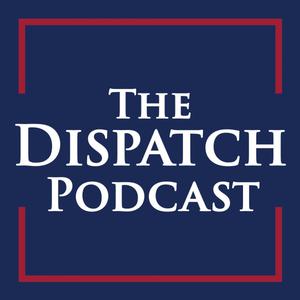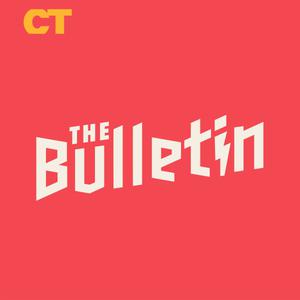
The Long Game
Jon Ward
An investigation into the reasons why Americans can't solve big problems anymore.
- 37 minutes 59 secondsEliza Griswold's new book Circle of Hope is a cautionary tale about placing too much hope in your church
Eliza Griswold's new book Circle of Hope: A Reckoning with Love, Power, and Justice in an American Church is about a church in Philadelphia that was started by a couple who became dramatic converts to Christianity in the 1970's. They became Jesus people.
And unlike many others in that movement, they stayed pretty radical. Griswold's book tells the story of this couple's attempt to hand the church off to the next generation. It doesn't go well.
I thought the book was an example of something I’ve lived, experienced and observed: placing far too much hope in what a local church can do and provide.
Griswold is a contributing writing for The New Yorker and directs the Program in Journalism at Princeton University. Her 2018 book Amity and Prosperity: One Family and the Fracturing of America, won the Pulitzer Prize.
9 October 2024, 2:19 pm - 59 minutes 32 secondsMajor Garrett talks about Neil Postman's book "Amusing Ourselves to Death"
Major Garrett is chief Washington correspondent for CBS News, and as he told me in our conversation, he is an "accidental television journalist" who "never imagined" working in TV and "never wanted it." He was a print reporter for 17 years before entering the world of television. Since then, he's proven to be one of the most formidable, best prepared interviewers in journalism. This dude is rigorous, smart, and fun! And you know what? Damn it, he cares.
Major is the host of The Takeout podcast and author of five books, including The Big Truth: Upholding Democracy in the Age of the Big Lie, and Mr. Trump's Wild Ride: The Thrills, Chills, Screams, and Occasional Blackouts of an Extraordinary Presidency.
Major read Amusing Ourselves to Death in the 1990's. He then soon after became a TV reporter for CNN, where he spent two years before moving to the then-nascent Fox News, where he became a Washington fixture as White House correspondent. That's where he was when I met him during my time as a White House correspondent for The Washington Times.
I was glad, as I told him, that Major has a textured view of Postman's work. I didn't want a cheerleader. But Major talks about the impact of the work on him, his views of its shortcomings, and its lasting value.
23 August 2024, 11:02 am - 40 minutes 27 secondsModerates Keep Fighting & Don't Look for the Easy Way Out, with Aurelian Craiutu
Aurelian Craiutu is the author of Why Not Moderation? Letters to Young Radicals.
Craiutu is the chair of Indiana University's political science department. He is reclaiming a word and idea — moderation — that is typically despised and criticized as weak and cowardly. This is a misunderstanding of what moderation is, he insists.
Moderation is not for the weak or the indecisive, Craiutu says. Instead, it is a fighting creed which requires courage, strength, and savvy. It's not for everyone, he says. In other words, the implication is that some people don't have what it takes to be a moderate, because it's much easier to be a radical, or a purist, or an ideologue.
"Maintaining our civilization is an endless and complex task," (23) Craiutu writes.
Moderates do not look for silver bullets to perform this task. They recognize that it is an ongoing, never-fully-solved challenge. And they have a "willingness to exist inside open-ended situations that do not come full circle and cannot be unequivocally settled" (72).
In other words, moderates are fighters who aren't looking for an easy way out or for a vacation from the ongoing and ever present task of maintaining an open and free society.
30 July 2024, 11:51 pm - 58 minutes 37 secondsYuval Levin's "American Covenant" is a blueprint for peace-making and effective governance
It is the 80th anniversary of D-Day. I just finished watching the ceremony in France, where they honored WWII vets who still live, and those who never came home. It was incredibly moving.
But we can't just look back and grow emotional during inspiring video montages. We must think about how to avoid the paths of division that could send future young men and women to similar fates. We can honor those brave WWII vets further — now — by listening to those who are trying to help us remember how to resolve our differences peacefully, rather than through violence or force. Yuval Levin is one of those people. My interview with him about his new book, out next week, "American Covenant: How the Constitution Unified Our Nation -- And Could Again."
Yuval's argument is that our Constitution is more than a legal document, though it is that. The Constitution is also a blueprint, a map, which lays out how our nation was intended to solve problems and resolve disagreements.
James Madison, the nation's fourth president, was one of the chief architects of our constitutional system. And our system has a psychology of sorts, Yuval's book says. This system defines unity as acting together even when we don’t agree. Madison and others designed an architecture of checks and balances and disparate power centers that are intended to pull and push us into engagement with those who are different and think different. It is that action together which creates common purpose and cohesion, a unity of "peace but not quiet," as Yuval writes.
"Politics is haggling, or it is force," he quotes Daniel Bell as saying. He adds: "We have forgotten that the only real alternative to a politics of bargaining and accommodation in a vast and diverse society is a politics of violent hostility."
Many Americans despair that we can repair our divisions. But Levin rejects that despair. He calls his book "hopeful" but says that does not mean he is necessarily optimistic. "Optimism and pessimism are both dangerous vices, because they are both invitations to passivity," he writes. "Hope is a virtue, and so it sits between those vices. It tells us that things could go well and invites us to take action that might help make that happen and might make us worth of it happening."
The way we move toward this unity of "peace but not quiet" is by thinking more carefully about how our system is structured, and what kind of behavior it incentivizes: cooperation across difference as the Constitution intended, or pulling apart, demonizing the other side and fearing those who disagree, and performative outrage.
6 June 2024, 1:05 pm - 40 minutes 59 secondsHigher ed has lost sight of mission and purpose, John Inazu says
John Inazu's new book is Learning to Disagree: The Surprising Path to Navigating Differences with Empathy and Respect. John teaches on criminal law, law and religion and the First Amendment at Washington University in St. Louis. He is an expert on religious freedom. And he is a senior fellow with Interfaith America. He is also a former Air Force officer who was working in the Pentagon on 9/11 when a hijacked airliner hit the other side of that massive building. And finally, he is the son of Japanese-American father who was born in an internment camp during World War II, where his American citizen grandparents were incarcerated for three years simply because of their ethnic heritage.
John's book is structured around the rhythm of a law school year. The reason, he says, is because he thinks the law has something to teach us about how to approach disagreement.
We talk here about why he thinks his book has surprising advice. We also spend a lot of time talking about the protests on college campuses about the war in Gaza, which have reached a fever pitch over the past week, and what his book offers to that incredibly intense disagreement. We actually kept coming back to the issue of American universities and their purpose and mission.
29 April 2024, 2:03 pm - 54 minutes 21 secondsWe Are Not Powerless: American Politics is "Entirely Fixable" says Nick Troiano in his new book "The Primary Solution"
We keep looking at our broken political system — the politicians who show up on our TV's and our phones, the lawmakers who end up in Congress, and the general lack of solutions to our biggest problems — and we shake our head. We promise to vote the bums out. We vow to drain the swamp. We pledge to overturn the plutocracy.
But we don't think about our assembly line, the system that gives us the choices we are presented with.
Remember Lee Drutman's line? "Who chooses the choices?"
That's the right question. When we show up to the toy store, and don't like our choices, we're not asking who is making the decision to limit us to these options. We simply keep buying from their limited selection, hoping for a different outcome.
The point of Nick's Troiano's book, The Primary Solution, is that we have to change the way we choose our choices. This means getting rid of party primaries, which have become a weapon used by ideologues and zealots to turn our politics into a bloodsport rather than something that serves its citizens.
Nick's book is an explanation of how that came to be, why it should be changed, and how we can change it.
You can also read a series of four Substack posts on the book here.
1 March 2024, 5:02 pm - 53 minutes 2 secondsWhat is a Christian politics? Michael Wear's new book argues it's mostly about who we areBreak the system. That's what one New Hampshire voter, a 58-year old retired Army officer, said he wants the president to do, in an interview with Politico Magazine. It's only the most obvious example of many of us tend to do from time to time. We pretend, or actually believe, that politics is a form of magic. In other words, we think we can elect a person, or pass a law — as if we were waving a wand — and this will fix our problems. But Michael Wear argues in The Spirit of Our Politics that a politics of magic is like trying to take a shortcut, and it won't work. "Our society, politics, and churches are hampered by a technological conceit — that we can attain the kind of society we seek without coming to terms with the kind of people we are and without becoming a different kind of people," (147) he writes. "Our society produces mass shootings at an unparalleled rate and scale, for instance, not in spite of the kind of people we are, but because of the kind of people we are." What is needed, Michael argues, is a resurrection of spiritual formation. "Spiritual formation is not a question for Christians alone," (137) he says.5 February 2024, 10:30 pm
- 40 minutes 44 secondsDavid Leonhardt's book joins a chorus of warnings for the Democrats
The 1950's and 60's were an age of widely shared prosperity in the U.S. — across class and economic lines — that have never quite returned. Things were improving for all parts of society during the post-war period, and for all groups including Black Americans, despite the real presence of racial bias and discrimination against them. And things have not improved equally in recent decades. Things have improved since then. But the rate of steady and ongoing improvement and progress has slowed in many ways, and stalled in some.
All this is the subject of today's episode, an interview with journalist David Leonhardt of the New York Times. You may know David from the daily newsletter for the Times that he writes, which is the Times' flagship newsletter, The Morning. David's new book is called "Ours Was the Shining Future: The Story of the American Dream." It was recently named one of the year's top 10 books by The Atlantic magazine.
"The economy has grown more slowly than it did in the postwar decades," Leonhardt writes, "producing less bounty for the population to share." And, he adds, "the economy has become more unequal, with a declining share of that bounty available to most Americans, because it is flowing to a relatively small percentage of affluent households" (xxiii).
This is a problem for democracy, Leonhardt writes. His book is one of several recently that are, together, sending a loud signal to Democrats that they have become too strident and purist in ways that alienate large numbers of voters who they need to win elections. These books are imploring Democrats to focus on helping working class voters economically and to cast a wider and more tolerant tent on social and cultural issues.
See Privacy Policy at https://art19.com/privacy and California Privacy Notice at https://art19.com/privacy#do-not-sell-my-info.
10 December 2023, 11:00 am - 1 hour 5 minutesTim Alberta's new book portrays a tug of war for the soul of American Christianity
Tim Alberta's new book: The Kingdom, The Power, and the Glory: American Evangelicals In An Age of Extremism, is a sobering look at the results in history when a religious movement morphs into a political movement, and allows its identity to be taken over by political imperatives and goals.
Alberta's book documents the spread of Christian Trumpism, aided and abetted by conflict profiteers who have made "fear and hatred a growth strategy" inside the evangelical subculture for decades.
But Alberta also writes that, to his surprise, he found evidence that the doomsday industrial complex has been "floundering" more recently and that "somewhere along the line their momentum had stalled."
Alberta details the way that Russell Moore, Curtis Chang, David and Nancy French and others have begun to try to unite, connect and organize the many disparate and isolated members of the American church who do not worship a political leader or give blind allegiance to a political party.
Time will tell if this is accurate and durable. But Alberta's book is a remarkable work of journalism. Tim also tells his own story of loss, heartbreak, and trying to come to grips with the moment in which we find ourselves.
See Privacy Policy at https://art19.com/privacy and California Privacy Notice at https://art19.com/privacy#do-not-sell-my-info.
1 December 2023, 4:00 pm - 37 minutes 35 secondsBUILDERS Interview: Matt Murphy on how community & music help him fight the paralysis of our times
This is a Builders conversation. I'm doing these about once a month to highlight people who are not just cursing the darkness but are also building up their local community — and the country — through making something beautiful, through problem-solving, and by stitching together places of belonging and meaning. (Thank you Joy Moore for the inspiration!)
This past summer, we took our kids to visit WERU in Maine, which is near Acadia National Park. The station's General Manager, Matt Murphy, gave us a tour, and he even had our two youngest daughters do a brief on-air announcement in support of the station. We saw the floor to ceiling shelves of CD's and records, the small studio, and the kitchen, also filled with music.
I wanted to interview Matt for my Builders series because, as he says: “There's so much in the world that's challenging ... and all the hard times can have a certain degree of paralysis to them."
"And there's a lot of things in the world that I can't do anything about, but I can do a lot about making community radio a good environment for people to do their thing and serve the community," he told me. "So having something to do, that you feel can help make even a little bit of a difference, is really important."
That's exactly it. Having something to do to make even a little bit of difference is the cure for the ways that the bigger, broader world can make all of us feel hopeless and powerless sometimes.
See Privacy Policy at https://art19.com/privacy and California Privacy Notice at https://art19.com/privacy#do-not-sell-my-info.
20 November 2023, 3:00 pm - 54 minutes 14 secondsWhere Have All the Democrats Gone? With Ruy Teixeira
This week's podcast interview (audio above) is with Ruy Teixeira, about his new book with John Judis, Where Have All the Democrats Gone?: The Soul of the Party in the Age of Extremes.
It is an argument that both parties have been co-opted by big business. It spends all its time blaming the Democrats for their part in this, but that's because the authors believe the Democrats used to be the party of the working person, and that it can and should be again. They also view the Republican party, or at least large swaths of it, as a threat to democracy.
They are interested in Democrats winning elections, and winning elections is an issue of math. And they believe, based on quite a bit of statistical evidence and history, that the Democratic party has alienated key elements of the country that they need to win elections, both by losing touch with working class people on economics, and on social issues.
See Privacy Policy at https://art19.com/privacy and California Privacy Notice at https://art19.com/privacy#do-not-sell-my-info.
30 October 2023, 10:00 am - More Episodes? Get the App
Your feedback is valuable to us. Should you encounter any bugs, glitches, lack of functionality or other problems, please email us on [email protected] or join Moon.FM Telegram Group where you can talk directly to the dev team who are happy to answer any queries.
 The Russell Moore Show
The Russell Moore Show
 Straight White American Jesus
Straight White American Jesus
 Advisory Opinions
Advisory Opinions
 The Dispatch Podcast
The Dispatch Podcast
 Good Faith
Good Faith
 The Bulletin
The Bulletin